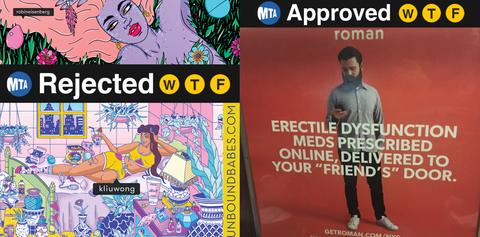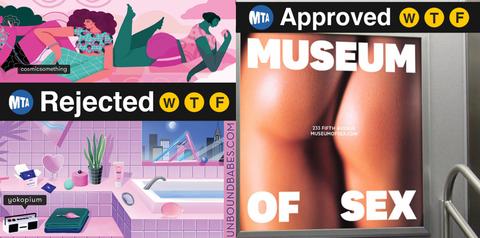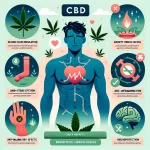If you live in New York City, it’s impossible to avoid the sex-minded advertisements that wrap around buses, decorate subway stations and line MTA metro cars. The NYC Museum of Sex, Roman (an erectile dysfunction medicine company) and several breast augmentation companies advertise prolifically with posters that shove sex and the body in the faces of daily commuters. So where does the MTA draw the line between what is explicit and what is not?
That question was recently answered when Unbound Babes, a sexual/women’s wellness company, submitted designs by a handful of well-known female Instagram artists for MTA approval.
The artists — Kristen Liu Wong, Laura Callaghan, Loveis Wise, Robin Eisenberg and Yoko Honda — were asked by Unbound to show what self love means to them. The resulting images depict fully dressed women lounging by the bathtub, in bed, in a field of flowers … and each subtly incorporates Unbound’s sex toy products.
You’d have to strain your eyes a bit to see the vibrators and handcuffs clearly, though; the artists put the focus on female self-love and let the sexual references fade into the pastel landscapes.

Despite the empowering message and tame sexuality of the ad campaign, the MTA rejected Unbound’s submission on the grounds that it was too inappropriate and violated two New York laws that “prohibit the public display of offensive sexual material.” But erectile dysfunction and breast enhancements make the cut?
Unbound Babes co-founder and director of content Sarah Jayne Kinney stressed the significance of the MTA rejecting female sexual wellness as explicit and inappropriate in an interview with Bustle, saying:
“Pleasure is a really big part of sexual wellness. If it’s important for someone with a penis to be able to get an erection, then women need to have access to the tools that help them get aroused. We view ourselves as a company within that space. We consider sexual wellness as something that’s really important to being a healthy, well-rounded human being. And therefore it’s important that we’re not ashamed and there is some visibility in the public —whether in discussion or advertising — about these issues.”
Although Unbound Babes is the most recent display of this double standard for male and female sexuality, this topic goes far beyond the New York City subway. We see a spotlight shone on sexuality in advertisements of all kinds: Super Bowl commercials, Carl’s Jr. hamburger ads, posters for cosmetic surgery, etc.

The most glaring difference between these explicit, often sexist, advertisements and the ones proposed by Unbound is the point of view. The artists of the Unbound Babes campaign draw from the female mindset, an angle typically passed by in favor of the male gaze.
The MTA’s rejection of an ad campaign that places health, pleasure and happiness at the fore is indicative of a much larger issue. Women’s health is treated differently than men’s health; it is stigmatized and seen as “dirty.” It is swept under the rug primarily because the male gaze is the one that dominates, and with ignorance comes fear.
The work being done by Unbound Babes and its artists is exactly what we need in order to dispel that fear and enforce the concept that women’s health deserves the same kind of platform and publicity as men’s.

















